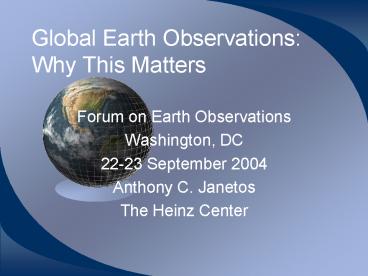Global Earth Observations: Why This Matters - PowerPoint PPT Presentation
1 / 17
Title:
Global Earth Observations: Why This Matters
Description:
Understanding what science and technological development is needed to deliver ... Balancing domestic and international requirements on an issue-basis ... – PowerPoint PPT presentation
Number of Views:33
Avg rating:3.0/5.0
Title: Global Earth Observations: Why This Matters
1
Global Earth Observations Why This Matters
- Forum on Earth Observations
- Washington, DC
- 22-23 September 2004
- Anthony C. Janetos
- The Heinz Center
2
Whats Important About GEO?
- A priori assignment of environmental benefits
- Attempting to understand what observations are
needed to realize those benefits - Understanding what science and technological
development is needed to deliver those
observations routinely, objectively, and usefully - Balancing domestic and international requirements
on an issue-basis - Balancing in situ and remotely observed
information
3
So What?
- Challenges in todays world
- Natural resource management
- Vulnerability to natural disaster
- Energy supply
- Health
4
Land-Use Change
- Biggest changes over past 40-50 years
- Acknowledged to be the biggest contributor to
losses of biological diversity - Major contributor to increase of CO2 in the
atmosphere - What sort of changes can we document over the
past few decades?
5
Main areas of deforestation and forest
degradation over the last twenty years
(1980-2000) - World
6
Natural Hazards
- Financial damage from natural disasters rising
sharply over last several decades - Much damage is preventable in principle
- Need continued improvement in knowledge of
seismic hazards and ability to forecast severe
storms
7
Energy in Todays World
- Fossil fuels drove most of the growth were
almost 80 of supply in 2000.
8
Human Health
- Water-borne diseases extremely common in
developing world - Malaria remains a scourge
- Travel, trade, land-use change all lead to
extremely rapid spread of infectious disease - Millennium Development Goals emphasize reduction
in disease burden, provision of drinking water
9
So What?
- Challenges of tomorrows world
- Population growth
- Development needs
- Atmospheric change and climate
10
World Population Growth
Population growth, 1750-2050
1999 6 Billion
Sources Before 1950 PRB estimates 1950-2050
UN, World Population Projections to 2150, 1998
(medium scenario).
2
11
Population Pressure
- In excess of 6 billion people globally
- Projections of population today have two
characteristics - Top out around 8-9 billion in next 50 years
- Stay fairly steady
- Most growth in developing world, BUT
- US has shown 2-3 growth per year
12
Population density in 1995 and most populated and
changing cities in 1990-2000 - world
13
(No Transcript)
14
Global CO2 Concentration
15
Possible Uses of GEO
- Development of indicators of change necessary
- Periodic reporting on state of ecosystems on
which we depend - Periodic assessment of state of knowledge and
understanding - Development of mitigative and adaptive strategies
based on best science and observations
16
US and GEO in a Global Context
- Perception of US leadership
- Investment in science and training
- Technology development and trade
- Potential to reduce inequity of impacts,
especially in developing world - Potential to increase economic and human security
17
Whats Needed To Make GEO Work?
- Understanding of who benefits
- Public good
- Private sector
- Developing world
- Recognition of how the link between observing
systems and benefits can be strengthened - Connection to research and technological
enterprises - Benefit of multiple perspectives and points of
view in system design, operation, and oversight































